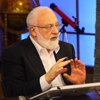 From My Facebook Page Michael Laitman 9/7/22
From My Facebook Page Michael Laitman 9/7/22
Ken Burns is regarded by many as one of the foremost documentarians of American history, with iconic works such as “The Civil War,” “Jazz,” and “Baseball.” Recently, he completed a project that began in 2015, initiated by the U.S. Holocaust Memorial Museum, about America during the Holocaust. The result of the project is a PBS six-hour documentary divided into episodes. The series, titled The U.S. and the Holocaust, examines how Americans treated Jews and immigrants during World War II, and reaches daunting conclusions.
JTA interviewed Burns and his team about the project, which “chronicles the xenophobic and antisemitic climate in America in the years leading up to the Nazi genocide of Europe’s Jews: a nation largely hostile to any kind of refugee, particularly Jewish ones, and reluctant to intervene in a war on their behalf.”
The series exposes not only America’s indifference to the fate of the Jews in Europe, but also the reluctance of many American Jews to help their European coreligionists. According to Lynne Novick, a Jewish member of Burns’ team, these Jews didn’t want to let any more Jews in, at least in part because they looked down on the Eastern European refugees as poor and unassimilated. “It took me a while to really get my mind around the idea that there was a significant voice within a powerful Jewish American community that [believed] we shouldn’t say too much because it will just stir the pot and awaken more antisemitism,” Novick said.
In an interview for CBS about the series, Burns said that seeing how antisemitism is increasing in America today, he is afraid that what happened in Germany might happen in some form or other in the US, as well. At the end of the interview, he implores the American people: “There is, right now, all of the elements coalescing for something bad to happen again. Let’s not get there again, as human beings, please, let’s not get there again.”
Films such as The U.S. and the Holocaust are helpful in that they offer a glimpse into what might happen today. The way the new cataclysm unfolds will certainly be different from the past, but its purpose will be the same as the old one: to cleanse the Earth of Jews. Regrettably, I think we are only a few years away from it.
Yet, the glimpse into the past will also have a negative side to it: Instead of deterring us from repeating the horrors of the past, it will legitimize it in the eyes of many people. Once people see that America has been antisemitic for generations, it will lift the veil of shame and they will not be embarrassed to show their real feelings toward Jews.
To me, the most important lesson from the series is the fact that Jews denied other Jews an escape from persecution. Worse yet, even when the world learned the truth about what was happening in Europe, American Jewry still made no serious attempt to influence decision makers to assist the Jews. In this attitude of division lies the seeds of the next catastrophe.
Jews have never been defeated when they were united. Every tragedy that has ever befallen our people had always been preceded by a period of division, internal bickering, slander, and often violent infighting. In different cloaks, Jewish internal hatred has been a precursor of every woe, from the Babylonian exile through the destruction of the Second Temple, the expulsion from Spain, the Holocaust, and virtually every slaughter and expulsion in between. Jewish division weakens us, emboldens and strengthens our enemies, flares up their hatred, and galvanizes them into action against the Jews.
Today’s American Jewry shows the exact same symptoms of division that have always preceded our past calamities. Therefore, I have no doubt that unless the Jews unite, another heartbreak is on its way.
We can still avoid it. If we unite, we will prevent it.
By we, I am not referring to American Jewry in particular, but to the Jewish people as a whole. If Jews unite anywhere in the world, it improves the state of Jews around the world. We are responsible for each other, as our sages have told us eons ago. Our mutual responsibility has never been broken; we simply do not use it to our benefit, and therefore suffer.
In the few years we have left before the arrival of another tidal wave of Jew-hatred, we can reverse the ominous course. But for this, we must agree to keep our brethren in our hearts, to agree to unite despite our disputes, to accept that we are one nation under God, one, united Jewish nation.
For more information on the connection between division among Jews and a rise in antisemitism read The Jewish Choice: Unity or Anti-Semitism: Historical facts on anti-Semitism as a reflection of Jewish social discord.

Photo Caption: Filmmaker Ken Burns speaks at the gala ceremony for the inaugural Library of Congress Lavine/Ken Burns Prize for Film, October 17, 2019. Photo by Shawn Miller/Library of Congress.
Filed under: Anti-Semitism, Facebook - No Comments →
 Michael Laitman, On Quora: “Why is there so much hate towards Israel?“
Michael Laitman, On Quora: “Why is there so much hate towards Israel?“

 From My Facebook Page
From My Facebook Page 









